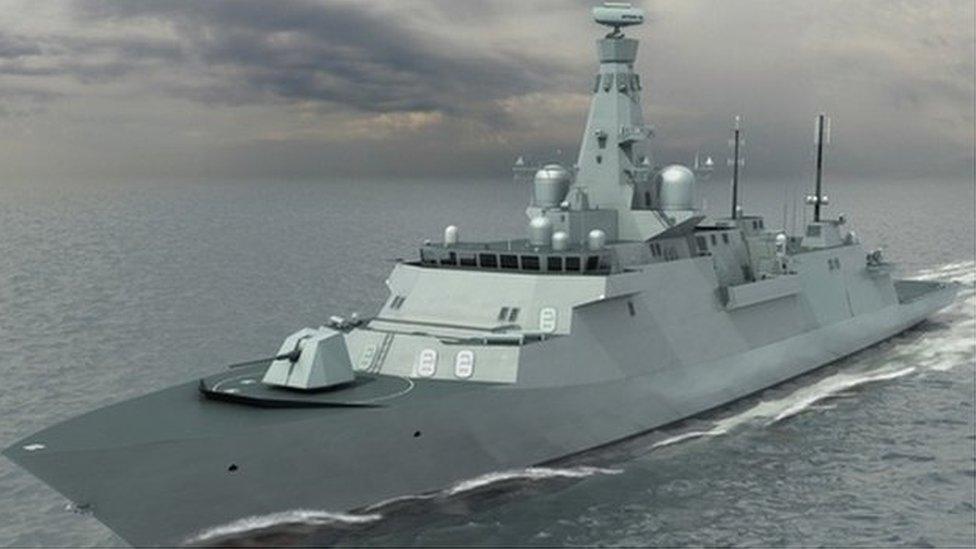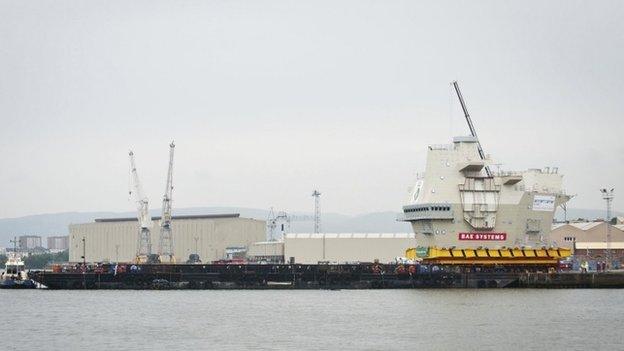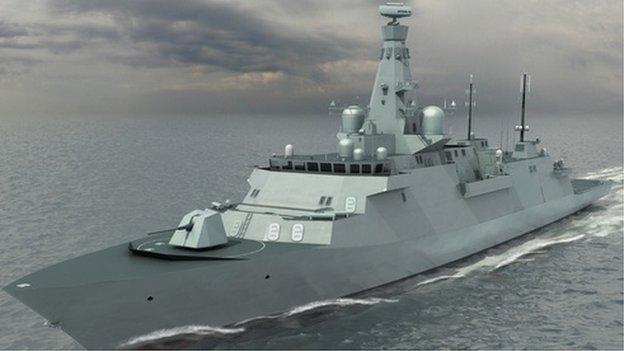BAE Systems workers issue job cuts warning
- Published

Shop stewards at BAE Systems said they had been told of delays to vital contracts for the next generation of Royal Navy frigates
Workers at BAE Systems' shipyards on the Clyde have vowed to do whatever it takes to avoid further job cuts, after learning of delays to contracts for the next generation of Royal Navy frigates.
The warning came after shop stewards met to discuss briefings by the firm.
They are informing the workforce of their determination to fight any compulsory job losses.
They say the problem comes from slower release of Ministry of Defence (MoD) funding for Type 26 warships.
That means work on them will start later than planned, and will be carried out more slowly, probably requiring fewer workers.
Hundreds of jobs have been lost on the Clyde in the past 18 months as BAE reduced shipbuilding capacity.
'Deceived'
On Friday, GMB union convener Gary Cooke said the Clyde workforce had been "deceived" and "betrayed", after being promised investment in the yards, which employ more than 2,500 people.
A BAE Systems spokeswoman said the company was working with the Ministry of Defence to agree a revised timetable for the Type 26 ship, and for two offshore patrol vessels which have been added to the current order for three.
She added: "We are engaging our trades unions as we work through this process. Our focus is to deliver the capability the Royal Navy needs, while ensuring the best value for UK tax payers."
An MoD spokeswoman said: "The government is committed to building ships on the Clyde and to the Type 26 programme.
"Over the next decade, we will spend around £8bn on Royal Navy warships.
"As set out in the Strategic Defence and Security Review, we will build two new offshore patrol vessels on the Clyde, maintaining Scottish shipbuilding capability ahead of the start of the Type 26 build.
"We will also consult with industry and trade unions as part of the National Shipbuilding Strategy, which will set the UK shipbuilding industry on a sustainable footing for the future."

Douglas Fraser
Business and Economy Editor
This isn't a bad time to exert pressure on the Ministry of Defence over its commitment to building ships on the Clyde. There's an election on, and a referendum.
The last referendum featured a lot about the prospects for keeping the yards busy by building complex ships for the Royal Navy. Unions say the pledges made then are not being honoured now.
A £200m plan to invest in a covered shipyard at Scotstoun - modern and efficient enough to win export orders - has come to a much lesser plan, focussed more on Govan. Shop stewards say there's little sign of that happening so far.
The big challenge is to keep the big workforce busy when there's only one big customer, but with an austerely squeezed budget.
The aircraft carrier work is winding down, though 250 Clyde workers are now engaged in assembly work at Rosyth in Fife. Three Offshore Patrol Vessels are under construction, with two more being ordered. It looks like a plan that has more to do with shipbuilding capacity than the Royal Navy's needs.
The Ministry of Defence says it still plans to build eight Type 26 frigates on the Clyde, having committed a lot of money to planning and procurement. The plan until December was for 13. But there is a shift of £750m in the budget, stretching it into more distant, less constrained fiscal years.
If the start of work is further delayed, and it then ramps up more slowly than planned, the consequences for the workforce look obvious. Hence the lobbying effort to re-instate that money.
And although the end of the current planning period is ten years away, it's not too early to be asking if the Clyde yards will be fit for purpose then, without a lot more investment.
- Published21 May 2015

- Published20 February 2015
